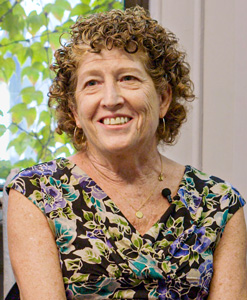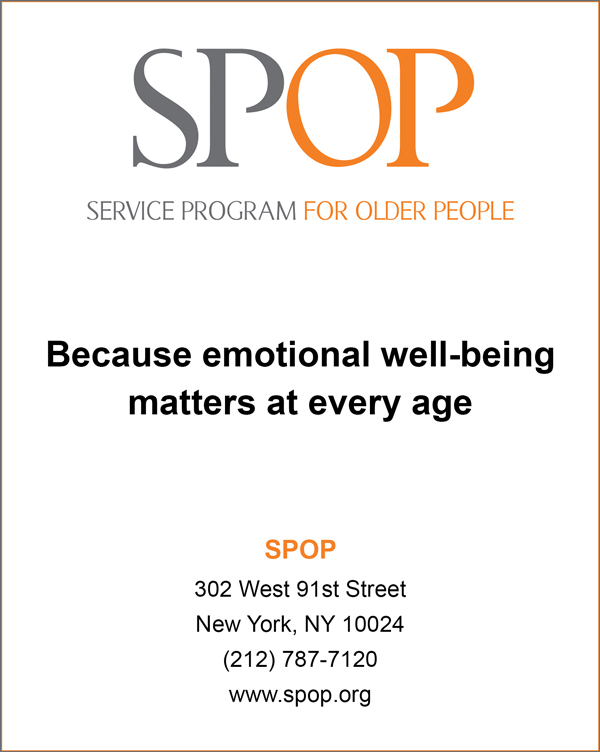When Client R, age 68, was referred to Service Program for Older People (SPOP) ten months ago she described symptoms of depression and anxiety – and she stated emphatically that therapy was for “rich white people” and not for her. She identified herself as an older Black Puerto Rican lesbian and said that when she had tried therapy before she always felt shamed and alienated as she told her story. Fortunately, the bilingual intake coordinator kept her on the line and listened with a trained ear.

Nancy Harvey, LMSW
R grew up in a home where sexuality and mental health were taboo subjects. She was rejected by her parents when she came out, and she has had no family contact or support for over 30 years. She has struggled to form authentic intimate connections with either peers or romantic partners. After retirement from a 30-years career in the food service industry she found her “dream job” of working in a record store – only to quit after she felt harassed for her age and appearance.
R had tried psychotherapy a few times, but she resented having to educate her therapist about her life experience; she kept repeating that therapy was not for someone of her background. She described her sense that the therapist could only focus on one or two of her identities and couldn’t absorb her in totality.
The intake navigator encouraged her to talk and assured her that SPOP could connect her to a treatment team that understands the complex layers of identity that an older person may experience. She encouraged R to complete the intake process – with the result that R now meets each week with a SPOP therapist and is grateful that she feels seen and heard.
Here was an individual who was suffering deeply after decades of trauma, isolation, and discrimination relating to her sexual identity, gender expression, race, and ethnicity and yet was afraid that therapy would re-traumatize rather than help her. Stigma and shame associated with mental health and sexuality were deeply ingrained in her – and had, in fact, been reinforced by her previous experiences.
We often hear that the pandemic and telehealth have helped to remove stigma as an issue, but for many older adults it remains a barrier to treatment – a barrier that can play out in unique ways, as R’s story indicates. Our agency, Service Program for Older People (SPOP), is dedicated to providing community-based behavioral healthcare for older adults in New York City, and we have developed programs and services to address such barriers as economic hardship, physical disability, language, transportation, or fear. Stigma, however, is often the most complicated and challenging barrier that we encounter.
Founded in 1979, SPOP is one of the largest and longest-standing agencies of its kind in the U.S. We serve 2,000 individuals each year through an outpatient clinic, a day program for adults with serious mental illness, bereavement support for adults of all ages, and training at the intersection of aging and behavioral health. Our client population reflects the racial and ethnic diversity of New York City and is overwhelmingly low-income, medically frail, and socially isolated.
We learned early on that our success would depend on three essential factors: (1) assembling a staff trained in the diverse and complex needs of older adults; (2) making treatment more accessible by offering services at neighborhood locations; and (3) connecting to hard-to-reach older adults by working in partnership with other community-based organizations. That strategy has enabled us to reach out to the most isolated and vulnerable older adults and acknowledge the full life experience of each client without judgment.
Our approach with Client R reflects that strategy. R was initially referred to SPOP by SAGE, the first and largest organization in the country to provide services and advocacy for older LGBTQ+ adults. SPOP has a long-standing partnership with SAGE, and we operate clinic satellite offices at two SAGE older adult centers where we offer individual and group therapy, psychiatric services, outreach workshops, and cross-training with SAGE staff. This partnership has enabled SPOP to offer treatment that is LGBTQ+ affirming and that prioritizes cultural humility and sensitivity through trainings and workshops.
When R had her first conversation with SPOP, she was following guidance from a trusted source at SAGE, which helped to support a degree of openness from the outset. During that initial call, she spoke with a bilingual intake navigator who is trained in anti-racist clinical practices, LGBTQ+ affirming treatment, and how to listen without judgment. We were able to gather essential information, flag her for fast-track assessment, and assure her that SPOP had the resources she needed. We addressed stigma and established trust within the first 30 minutes of the relationship, and we moved quickly to schedule her next appointment.
This approach requires a considerable investment in staff. SPOP offers ongoing training for direct service staff in cultural competency, LGBTQ+ competency, diversity and inclusion, and best practices for communication, data collection, and intake services. The result is a team of professionals who use consistent language, are prepared to connect individuals to other resources as needed and understand that an older person is far more complex than just their chronological age.
R is now working with her therapist to understand and process the trauma she has experienced. She is working on strategies to build self-esteem, develop skills to support trusting relationships, understand her depression and anxiety, and allow for anger. She has joined a support group at the Edie Windsor SAGE Center in New York City and is working a few days a week at an LGBTQ+ thrift store where she feels accepted and appreciated.
Nancy Harvey, LMSW, is Chief Executive Officer of Service Program for Older People (SPOP). Launched in 1972 and independently incorporated in 1979, SPOP is one of the largest and longest-standing agencies entirely focused on community-based behavioral healthcare for adults age 55 and older in New York City. Learn more at www.spop.org.





